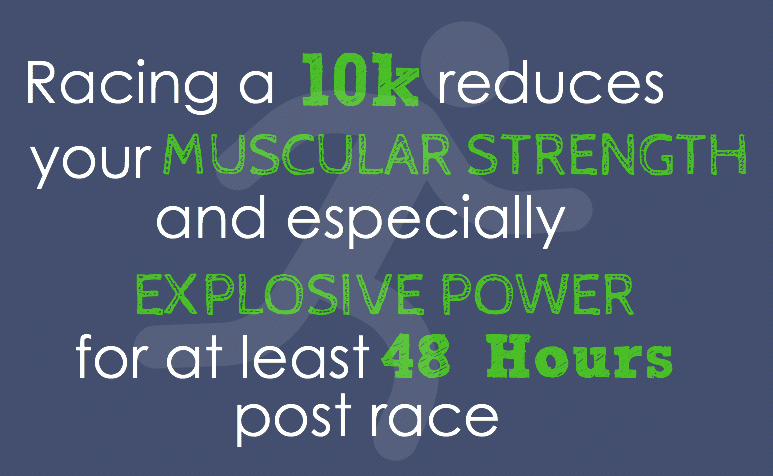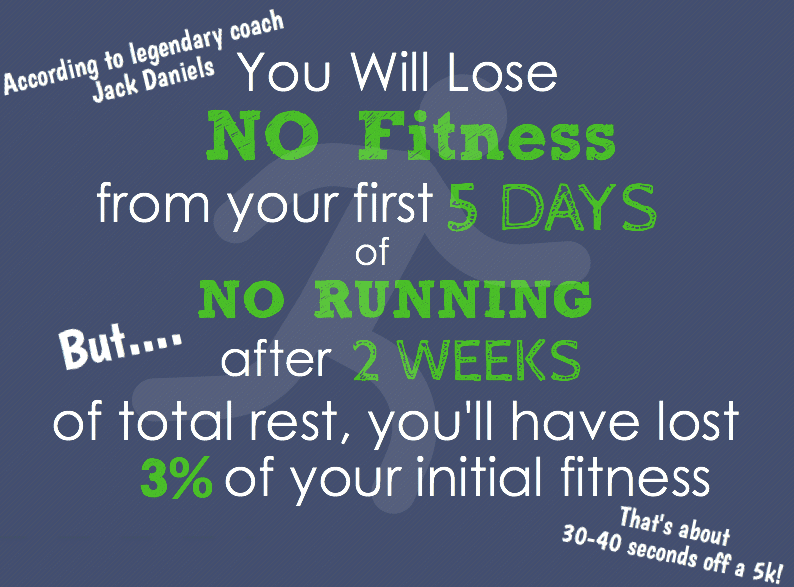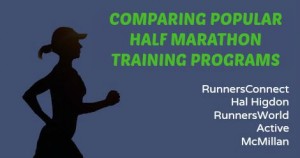Marathon training is like preparing for a boxing title match: months of lonely workouts culminating in one exhausting battle.
Brings a lot of satisfaction and a sense of accomplishment, but what if we want to focus on the shorter distances?
If you’re in the midst of a season of 5k, 10k, and half marathon races, there’s no definitive end-point, no end-all be-all day that defines your season.
This can make it tough to pull the plug—especially in the spring and summer, there’s always one more race that you want to run.
Does this sound familiar?
“If I can just keep up my fitness for a week or two, I might have another crack at a PR.”
Before you know it, you’ve been racing for weeks on end, and you’re feeling a bit burned out, maybe even on the verge of overtraining.
Dr. Mark Wotherspoon, a Consultant in Sport and Exercise Medicine suggests that overtraining can require six months to even a year to bounce back from.
Not something any of us wants to face.
If you’re genuinely interested in learning about how to get the most out of yourself as a runner, but you are not sure when to hit reset after a season of short and medium-length road races, you’re in the right place.
Whether it has been a season of one PR after another, or you are proud of yourself for not giving up when the bad races kept on coming, this post is going to help you know when to take time off to help you get more joy, satisfaction, and of course, PRs, when you start running again.

Is Time Off After A Season Worth Losing Fitness For?
So, how much time off do you need?
Answering that question is a going to be a matter of weighing the amount of physical and mental recovery you need against the potential downsides of losing fitness during your time off and having a harder time working back to training.
Muscle damage from one shorter distance race can require up to 4 days to return to normal
Though a 5k, 10k, or half marathon won’t beat you up as badly as a full marathon or an ultra, you’ll still accumulate fatigue and muscle damage as you continue to race often.
For example, a 2002 study by researchers at the University of Connecticut found:1

With regards to the half marathon, two studies by a research team in Italy found that that biological markers of muscle and liver damage are elevated in half marathon finishers for at least 24 hours following the race.2, 3
Unfortunately, neither of these studies followed up two, three, or four days later, so it’s hard to say when these levels returned to normal.
However, another study by Lance Dawson, Kimberly Dawson, and Peter Tiidus at Wilfrid Laurier University in Canada found that it took four days for muscle soreness to completely return to baseline values following a half marathon.4
Don’t let mental struggles hold you back
Another equally important consideration is recovering from mental stress. Running a great 5k, 10k, or half marathon takes a tremendous amount of mental effort.
Mental exertion has finite limits, just like physical exertion. Research on the phenomenon of “ego depletion” shows that completing a task that requires a lot of focus or concentration, like running an all-out race, will reduce your ability to perform well at subsequent tasks, whether they’re physiologically related or not.5
There’s no research on how long it takes to recoup your mental energies (and it probably varies from person to person), but the time you need for mental recovery is likely proportional to how much mental energy you’ve expended during your racing season.
If you’ve had a lot of long, tough, grueling races, you’ll probably need more time off than if you’d only done a few low-key races.
The Italian coach Renato Canova, who works with many of the best Kenyan and Ethiopian distance runners, writes that top runners often need two months of mental relaxation and low-key training before they’re able to turn their full attention back to preparing for another marathon.
You probably won’t need that long, but the lesson remains: don’t neglect mental recovery!
How much fitness will you actually lose in time off?
While time off from running is great for physical and mental recovery, it can pose some risks, too.
If you take too much time off, you’ll lose a good chunk of the fitness you worked so hard to acquire, and it can be harder to avoid injury when you’re working back into training.6

All the adaptations that allow you to run faster and further as you gradually increase your training also work in reverse when you take a lot of time off.
Not quite convinced? How about an analogy
Why Runners Are Like Sponges Doing the Dishes
No, that is not a mistake. Listen to this:
Imagine your body is a sponge, and your training the water coming from a faucet.
When you are a beginner runner, you are similar to a dry sponge; ready to absorb all the training (water) that you can.
The training (water) flows into your body (sponge) when you turn on the faucet. You soak in all the training, and do your job well.
But:
If you turn the water on too fast (increase your training too quickly), the sponge (your body) will be saturated. It is best to turn the faucet on gradually (start slowly with your running).
Here’s the deal:
Over time, if you keep filling up the sponge (your body) with water (training), the sponge will reach a point where it simply cannot absorb any more water, no matter how slowly you turn on the water (increase your training).
Imagine you’ve now done the dishes every day with the same sponge for 2 months.
Picture how deflated, weak, and gross that sponge would be.
After training for a long time without any kind of mental or physical time off, your body will be in a similar position.
By taking 3-7 days off 1-2 times per year, your sponge will be ready to absorb more water when you start running again because you have that previous training block behind you.
What’s the bottom line?
Your body will be able to absorb more training faster and you can squeeze more out of your training.
How do I know how much time off running is enough?
Ultimately, the perfect amount of time off will be something that varies from person to person.
By taking into account research on physical fatigue and intuition on mental fatigue, a good benchmark might be five to seven days of complete rest.
Follow this up with another week of short, easy jogs every other day to maintain fitness and mechanical integrity while still allowing you to refresh your mind and body.
After that, you should be rejuvenated and ready to start up training for another season of racing.
9 Reasons for a 5k, 10k, or Half Marathon Runner to Rest After a Goal Race
You’re convinced about the importance of time off after a road racing season, but we thought we would recap with 9 reasons you need time off, even if you are not running far enough to where you feel it is justified.
If you’re serious about taking what you just learned to the next level, time off will help, here is why:
- Your muscles will thank you. It can take your body up to 4 days to repair the muscle damage after racing a 5k, 10k, or half marathon.
- Your mind needs a rest too! Your spirit can only handle pushing through that pain barrier so many times. Taking a rest will give you time to just relax without the pressure of a goal.
- After a long season of race after race (no matter what level you run at), your body will struggle to keep adapting to the training. You become stale, and be at a serious risk of overtraining.
- Don’t worry so much about a loss of fitness; you will lose nothing with up to 5 days off running.
- You will begin to miss the endorphin rush and the runners high. You will appreciate it so much more when you return to running.
- If you are concerned with feeling like a wimp, even the elites take up to two months of rest and low key training after a big season!
- It will free up time to spend with family and friends; your relationships will improve, and you can make the most of wearing nice clothes (and ladies, straighten your hair!), without worrying about having to change out of them in a few hours!
- It will give you time to think about what you would like to accomplish next. Maybe a trail race, or researching a marathon training schedule.
- You can improve your schedule to fit in more of the supplemental activities that can help take your training to the next level. That could be adding yoga, not making these foam rolling mistakes, or creating recipes to include these recovery foods.
Have we convinced you?
No, it is not time to go buy a new sponge. Just give your current sponge some time to dry out, and it will be able to get back to those dishes in no time!






